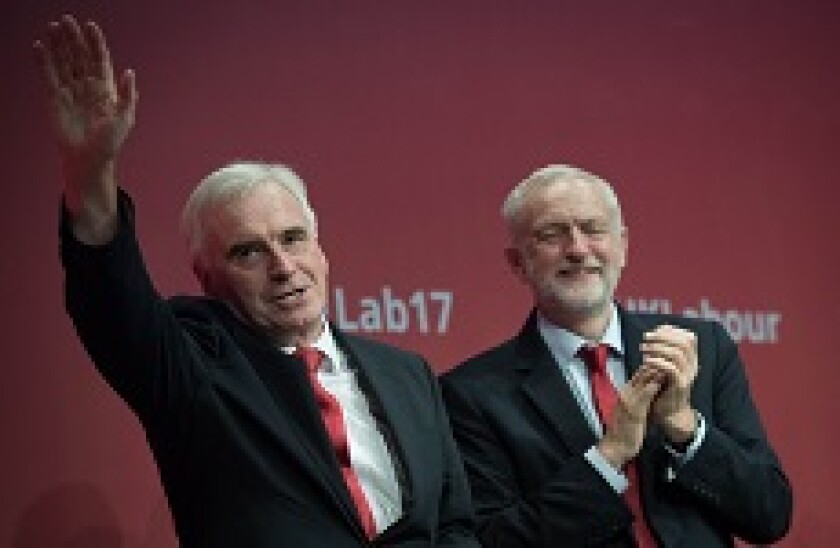The placements — which were sold to refinance a £400m public bond that expired on April 7 — were issued privately by Thames Water’s Kemble Water Finance Ltd entity, a vehicle for the holding company of the regulated water company. Notes of £10m and £100m due in 2025 were placed in November, a £200m 2025 in December, and a £149.8m 2026 deal this month.
Natwest Markets and Santander arranged the deal. The prospectus for all four Kemble prints was listed on the Irish Stock Exchange on Friday.
While many previous issue documents from utility companies contain redemption clauses such as "any governmental action that would lead to a materially adverse effect", Kemble's new issues include a more specific nationalisation event trigger, which gives noteholders the option to accelerate the debt, making it immediately due and payable.
The prospectus says this event would be triggered by “the seizure, expropriation, nationalisation or acquisition (whether compulsory or otherwise, of a material part, and whether or not for fair compensation) of all or a majority of the issued shares of any member of the group or any of the material rights or material assets of any member of the group… by a governmental agency.”
In other words, the form of the nationalisation does not matter — the clause is not just a protection against an uncompensated buyout. The clause also specifies that even the acquisition of part of Thames Water by an autonomous agency of government would count.
Some bankers felt that this additional clause added no more protection for investors than the broader clauses, which are widely seen in utility documentation. "Certain law firms — Allen & Overy, Linklaters and Clifford Chance — always do these kinds of documentation and they look to update the clauses," said one banker.
But two people familiar with the deal said certain investors required the new documentation to be added. One of those two, however, said Kemble Water could have placed the notes without the clause, if it had chosen, to other investors.
Horrid for Holdco
Two private placement investors and three agents said they had never seen specific nationalisation clauses in documentation for UK utilities private placements before this, but each thought it might become a regular feature in the years leading up to the next UK general election.
The opposition Labour Party’s finance spokesman, John McDonnell, used the party’s conference in September last year to flesh out plans to renationalise the water companies. The plans include a cap on bosses’ pay and a requirement that they reapply for their jobs.
One UK institutional investor who considered buying Kemble's paper said: "The Labour pledge would make such a renationalisation clause more common [in PPs]."
A paper published at the time said water company shareholders would be compensated by being given government bonds, with the level of compensation decided by Parliament. This could include deductions for pension fund deficits, "asset stripping" since privatisation, and state subsidies given to the privatised water companies.
The document did say, however, that “existing debts of the companies will be carried over with the companies under public ownership and honoured in full. They will be refinanced over a period of time so that the costs of debt are reduced.”
The paper further specified that Transport for London would be the financing model for the water companies — suggesting credit ratings, like TfL’s, of AA and Aa3 might be the target.
But these proposals may worry bondholders who do not hold paper of the regulated water operating companies, but debt from holding companies. Many water companies are owned by holding companies that have themselves issued debt. This enables the ultimate shareholders to put more leverage on the assets, as leverage at the regulated company level is legally limited.
Such debt is often “senior secured”, but secured only on shares in the operating company.
The owners of Kemble — the ultimate owners of Thames Water — are a group of UK and international pension funds and infrastructure investors, including Omers, the Universities Superannuation Scheme, Abu Dhabi Investment Authority, China Investment Corp and PGGM among others.
“Water in particular is deemed most prone to be nationalised,” said a private placement agent in London. “We’ve seen more questioning and more concern from investors around nationalisation in the past few years, and additional clauses addressing nationalisation specifically will be more likely in holdco and midco utility transactions in the next few years.”
An investor at a US institution with offices in London said: “We assume opco private debt will be fine — there is so much of it outstanding and it’s within the regulatory ringfence. But the danger is with holdco and midco notes, and private equity, where it’s not clear how nationalisation would actually work. The then government could just say — ‘You know what, we’ve never liked you private equity lot, so who cares if you don’t get paid?’”
Under Labour’s proposals, these shares would be compensated with government bonds, which, depending on the nationalisation price, might not leave them with enough income to pay coupons on their debt.
Water company deal documents have been flagging the risk of nationalisation in prospectuses for a long time, along with the various other standard corporate risk factors added into deal documents for investors to take note of. One banker familiar with this deal said: "Clauses around nationalisation are always in the documentation, just buried in the common terms agreement (CTA) documents, so this clause won't give investors more protection than they already have."
But these largely amount to boilerplate text — and are very different from an option that can be triggered. Aberdeen City Council, GlobalCapital understands, included a similar political put option in its £300m inflation-linked issues, but linked instead to Scottish independence.

